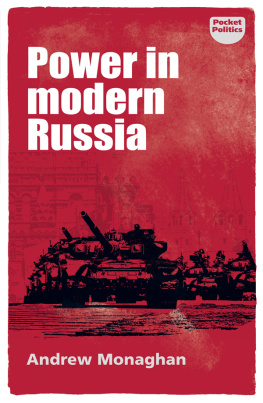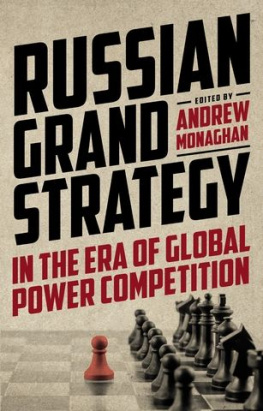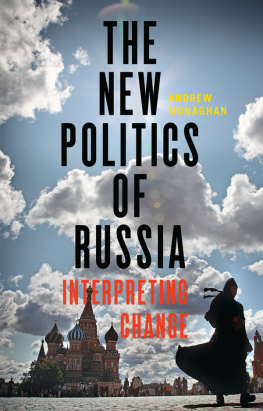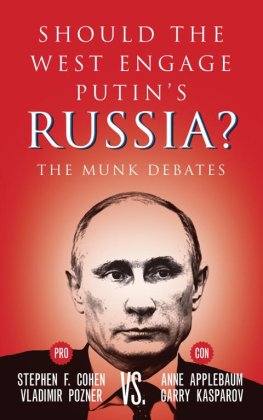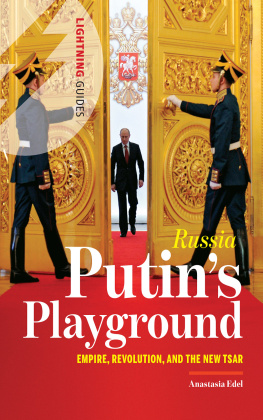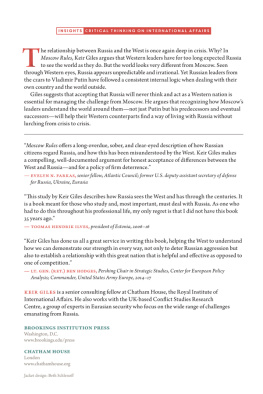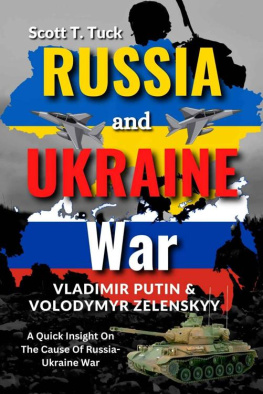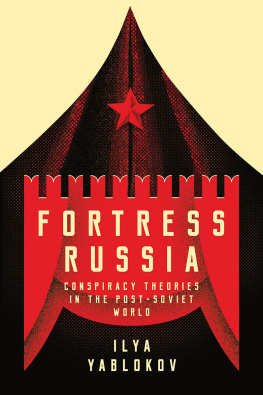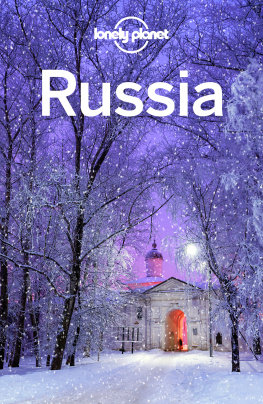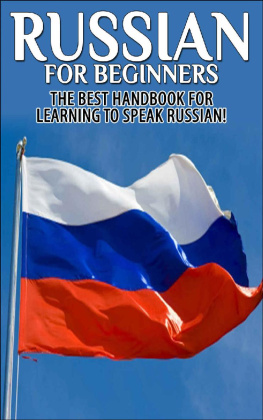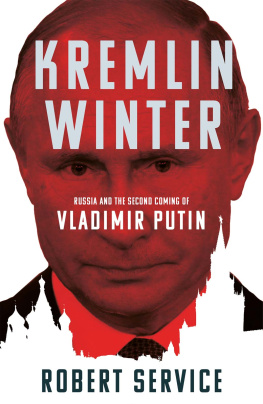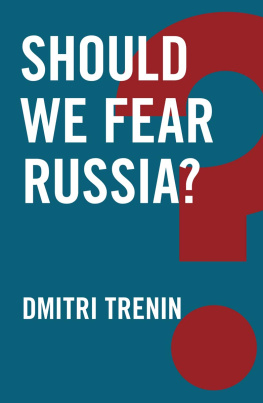POCKET POLITICS
SERIES EDITOR: BILL JONES
Pocket politics presents short, pithy summaries of complex topics on socio-political issues both in Britain and overseas. Academically sound, accessible and aimed at the interested general reader, the series will address a subject range including political ideas, economics, society, the machinery of government and international issues. Unusually, perhaps, authors are encouraged, should they choose, to offer their own conclusions rather than strive for mere academic objectivity. The series will provide stimulating intellectual access to the problems of the modern world in a user-friendly format.
Previously published
The Trump revolt Edward Ashbee
Reform of the House of Lords Philip Norton
Copyright Andrew Monaghan 2017
The right of Andrew Monaghan to be identified as the author of this work has been asserted by him in accordance with the Copyright, Designs and Patents Act 1988.
Published by Manchester University Press
Altrincham Street, Manchester M1 7JA
www.manchesteruniversitypress.co.uk
British Library Cataloguing-in-Publication Data
A catalogue record for this book is available from the British Library
ISBN978 1 5261 2641 2 paperback
First published 2017
The publisher has no responsibility for the persistence or accuracy of URLs for any external or third-party internet websites referred to in this book, and does not guarantee that any content on such websites is, or will remain, accurate or appropriate.
Typeset by Out of House Publishing
Many debts of thanks have accrued during the preparation and writing of this book. The origins of the idea took shape while I was at the NATO Defence College in Rome, and I would like to thank Dieter Lser, Grant Hammond, Rich Hooker and participants in the Roman Baths Advisory Group for their friendship and support. I also had the pleasure of developing the ideas as an Academic Visitor at St Antonys College, Oxford, and particular thanks go to Alex Pravda and Roy Allison for their support.
Much of the research work was carried out while I was Senior Research Fellow in the Russia and Eurasia Programme at Chatham House, the Royal Institute of International Affairs. I greatly appreciate the generosity of the Gerda Henkel Foundations Special Programme for Security, Society and the State for the financial support for the project Towards Mobilisation: From a Nation in Arms to a Nation Armed (201517). This support facilitated my own research, travel, and a number of workshops and seminars, and I am grateful both to the participants of these sessions for their active contributions and to Lubica Pollakova and Anna Morgan for all their help and support organising the events.
The book itself was written during my time as a Visiting Fellow at the Oxford Programme on the Changing Character of War at Pembroke College, and I very much appreciate the support and encouragement of Rob Johnson, Ruth Murray and the many others I have met through the programme.
Many thanks are due to Amanda Moss at Chatham House, and the editors of the journal International Affairs for kind permission to revisit, sew together and develop material already published, including the articles The Russian Vertikal: The Tandem, Power and the Elections (2011), Defibrillating the Vertical: Putin and Russian Grand Strategy (2014), and Russian State Mobilisation: Moving the Country onto a War Footing (2016).
I have also been lucky to enjoy the support of numerous librarians. Thanks to Simon Blundell, Richard Ramage at St Antonys, David Bates and his team at Chatham House and the library team in the NATO Defence College for all their courteous help. I am also grateful to my publishers at Manchester University Press, and particularly the series editor, Bill Jones, for their support for the idea of the book and seeing it through to publication.
Many other individuals have influenced the thinking that underpins the book, including discussions with numerous officials in the UK, USA, NATO and in Russia. Others, including David Glantz, Dov Lynch, Nazrin Mehdiyeva, Julian Cooper, Silvana Malle and Henry Plater-Zyberk, have been kind enough to read parts or all of the draft. I am grateful to all for taking the time to discuss these themes with me, and their firm but always gentle corrections. The book is much the better for their advice and wisdom, but where I have failed satisfactorily to incorporate it, and for any remaining errors, I alone am to blame.
In Russia, I have enjoyed many discussions and much kindness and patience in instructing me about how to attempt to understand Russias complexities and nuances. Im grateful to all those who have taken the time to talk to me. In particular, Ekaterina Vladimirovnas ability to cross cultural divides is exemplary, and Boris Mikhailovich and Mikhail Borisovich have always shown me a warmth and generosity that mentioning here barely acknowledges. They realise, I hope, the extent of my appreciation, and their influence can also be felt throughout this book.
Finally, and as always, my thanks and love go to my family, Charles and Dorothy Monaghan, and to Yulia. Their patience, love and support mean the world to me. I could not have written the book without it. Lara Andreevnas happy presence remains, as always, a bright light in life.
| GUSP | Main Directorate for Special Projects |
| KGB | Committee of State Security |
| MChS | Emergencies Ministry |
| MVD | Ministry of the Interior |
| NATO | North Atlantic Treaty Organization |
| NDMC | National Defence Management Centre |
| NG | National Guard |
| ONF | All-Russian Popular Front |
| SC | Security Council |
| UR | United Russia |
| VEB | Vneshekonombank |
Does the Russian leadership have a grand strategy? Is there a coherent and consistent strategic agenda? If so, what is it? What does President Putin have in mind? Is he, indeed, a strategic genius or is he making it up day-to-day? What will Russia do next? And what are Putins intentions regarding the West? As French journalists inquired of Putin himself, is Russian strategy on a path of dialogue, or expansion and conquest? Since the sharp deterioration in relations between the Euro-Atlantic community and Russia following the eruption of war in Ukraine in 2014 and Russias intervention in Syria in 2015, these questions have troubled senior politicians and officials in Western capitals.
Some doubt the idea of a Russian grand strategy. Michael McFaul, a former US ambassador to Russia, is among those who argue that Putin does not know what he wants from the Ukraine crisis, has no grand plan and makes policy up as he goes. Others see him as a tactician, but no strategist. The prominent strategic thinker Lawrence Freedman has argued that although Putin is good at making early moves he has not thought through subsequent developments, and that it is difficult to evaluate what Russian strategy is beyond the most general lines. Indeed, Putin is already failing, according to Freedman, since he is caught in a web in Syria.

